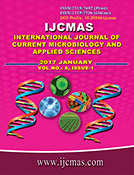


 National Academy of Agricultural Sciences (NAAS)
National Academy of Agricultural Sciences (NAAS)

|
PRINT ISSN : 2319-7692
Online ISSN : 2319-7706 Issues : 12 per year Publisher : Excellent Publishers Email : editorijcmas@gmail.com / submit@ijcmas.com Editor-in-chief: Dr.M.Prakash Index Copernicus ICV 2018: 95.39 NAAS RATING 2020: 5.38 |
Biological treatment aims at using plants and animals to reduce nutrients load and particulate matter in shrimp farm discharge. Although extensive literature is available on the different types of shrimp culture practices, its advantages and disadvantages including the impact caused due to enormous application of chemicals such as antibiotics and use of robotics, he information available on the treatment of effluent in general and biological methods in particular are very scarce. The extensive search of literature revealed that only a few works are available in the direction and the following works are worth mentioning. Some researchers used Halophytes for the treatment of aquaculture effluents and the solid management and removal for intensive land based aquaculture production system. However, information on the commercial utilization of coastal organisms and their possible extent of removal of water from the culture pond by growing them as secondary cultivars are wanting. Biodegradation of farm wastes could be accelerated by employing biological treatment using various important cultivable organisms such as edible seaweeds and similar others. Hence these organisms can be effectively cultured as secondary species to provide added income to the shrimp farmers apart from cleaning the discharge waters.
 |
 |
 |
 |
 |